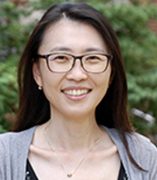
Minjung Ryu
Associate Professor
Department of Chemistry
Contact
Building & Room:
1570-F
Address:
1240 West Harrison Street
Email:
About
My research focuses on issues around diversity, equity, language, and participation in various STEM and chemistry learning settings. Throughout K-16 education, U.S. classrooms are becoming more diverse, representing multiple different races, languages, and cultures of students. Despite this demographic change, teaching practices and learning environments do not sufficiently support racially, linguistically, and culturally nondominant learners. Within this context, I am very interested in 1) how racial, ethnic, and linguistic minority students engage in classroom discourses in STEM and chemistry, 2) how multilingual learners use multiple different languages and representations to participate in learning activities, 3) how these learners discursively construct their identities, and 4) what are impacts of these social and linguistic interactions on their content learning. In my projects, I primarily utilize ethnography, video analysis, and multimodal multilingual discourse analysis to study aforementioned issues.
Currently, I am directing an NSF project to help high school science teachers better support English learners in linguistically diverse classrooms (NSF DRL #1813937). In this project, I design and implement a practice-based professional development program for high school science teachers. The goal of this research is to improve science teachers’ understanding of their students who bring diverse racial, linguistic, and cultural backgrounds and practices to leverage students’ rich sense-making resources. Before this project, I ran an after school project that engaged resettled Burmese refugee youth in learning and talking about STEM (NSF DRL #1612688). In this project, the learners learn about weather phenomena, climate, and climate change by conducting hands-on experiments, reading and writing, conducting online research, and verbally sharing their knowledge and experiences. Through the research in this setting, I explore how youth participate in STEM sense-making, engage in identity work, and leverage those experiences in informal settings into STEM learning in school settings and seek to find ways to enhance their STEM learning.
Education
Ph.D. — Science Education, University of Maryland, College Park (2012)
M.S. — Chemistry, Seoul National University, Seoul, South Korea (2005)
B.S. — Chemistry, Seoul National University, Seoul, South Korea (2003)